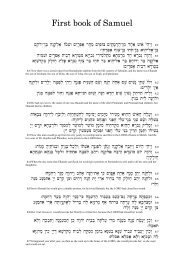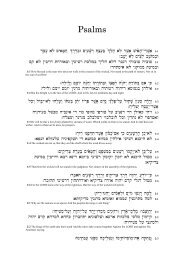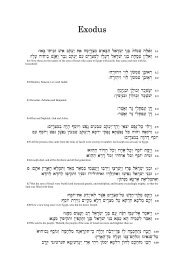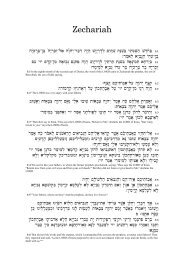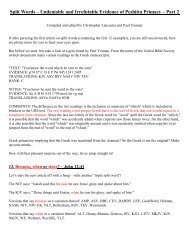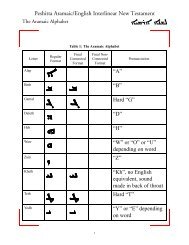ana translation
Untitled - Peshitta Aramaic/English Interlinear New Testament
Untitled - Peshitta Aramaic/English Interlinear New Testament
- No tags were found...
You also want an ePaper? Increase the reach of your titles
YUMPU automatically turns print PDFs into web optimized ePapers that Google loves.
JUDE 15-23]<br />
SUPPLEMENTAL NOTES. 135<br />
scribe's grammatical correction ;<br />
the true reading of Philox., with its<br />
irregularity, is no doubt that which the two oldest copies preserve.<br />
Harkl. corrects it in the opposite way, by writing the former verb<br />
as well as the latter in the infinitive (,*">SV?S). Notably,<br />
it is the<br />
habit of Harkl. to render Gr. infin. by infin. ;<br />
Philox. tends to substitute<br />
(where admissible) the fut. with j prefix.<br />
1 6. Here Philox. once more, in rendering /ze/xi/a^cxpoi, offers a fairly<br />
adequate periphrasis (see note on Gr. text in loc.) Harkl., :<br />
forsaking<br />
the guidance of the prior version, is misled by a reading (else unknown)<br />
which he records on his inarg., ^^i^vpot into an attempt to<br />
render the word etymologically (as<br />
if = /xc/x^o/jtevoi /xvptaSa),* --^,V<br />
IZoo^. White renders " conquerentes de principatu" but the Gr. of<br />
Harkl. marg. implies ]ZoS> (<br />
= /xvpias, as ver. 14), not (Zo29 (<br />
= /u,eya-<br />
Awo-uV*/, as ver. 25).<br />
Ib. For |Au> i'l..<br />
( = v7T6poyKa), see note (p. 17), and first Note supr.,<br />
on (MJQ.I, 2 Pet. ii. 18. The form here used is the Syro-Hexaplar<br />
rendering of the same Gr. word, Thren. i. 9, also (as cited by Masius,<br />
Syr. PecuL, s.v.),<br />
Deut. xxx. 11.<br />
20. Neither version attempts to express the superlative ayiajTu'-n;,<br />
both render merely as if<br />
dym, which no Gr. gives, were read here.<br />
22. For .OO1TV)\O (= KCU ovs (AW), 10 and 20 (and Arab, similarly)<br />
read .OOllSDO ; representing KCU TO i/xanov avrw (sc.,<br />
the e'<br />
The noun (JJlD is sometimes written without (, and its,<br />
use = f/xartov is frequent in Pesh. (In tlje footnote in loc., p. 37, the<br />
reading of 10 is wrongly given as tOOlQlSC-lO.)<br />
22, 23. To the notes (p.<br />
82 supr.) on the complicated variations<br />
in the text of these verses, the following remarks are supplementary.<br />
(a) Philox. here, against Harkl. and the other versions, and the Gr.<br />
manuscripts, supports the form in which the passage is cited by a<br />
writer so early and so learned as Clement of Alexandria (ors /xev<br />
e/c<br />
c, Sia/cpao/xeVous Se cA-eetre (Strom, vi. 8) and by Jerome<br />
* For an example of the etymological skill of Harkl., see his note on Act. x. 1,<br />
where he explains KopvyXios as = Kop))v r)\iov: also (assuming the later Syr.<br />
version of Apoc. to be his) his rendering of eV /ieV ovpavn/^an, as if it were<br />
written, eV /u.eVy oupa.i' at'uarj (or TOS) (Apoc. viii. 13).



